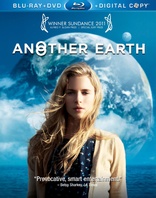Another Earth Blu-ray Movie
HomeAnother Earth Blu-ray Movie 
Blu-ray + DVD + Digital Copy20th Century Fox | 2011 | 92 min | Rated PG-13 | Nov 29, 2011
Movie rating
7 | / 10 |
Blu-ray rating
| Users | 4.4 | |
| Reviewer | 3.0 | |
| Overall | 3.2 |
Overview
Another Earth (2011)
On the night of the discovery of a duplicate planet in the solar system, an ambitious young student and an accomplished composer cross paths in a tragic accident.
Starring: Brit Marling, William Mapother, Kumar Pallana, Jordan Baker (I), Flint BeverageDirector: Mike Cahill
| Drama | Uncertain |
| Sci-Fi | Uncertain |
Specifications
Video
Video codec: MPEG-4 AVC
Video resolution: 1080p
Aspect ratio: 1.85:1
Original aspect ratio: 1.85:1
Audio
English: DTS-HD Master Audio 5.1 (48kHz, 24-bit)
Subtitles
English SDH, French, Spanish
Discs
50GB Blu-ray Disc
Three-disc set (1 BD, 2 DVDs)
Digital copy (on disc)
DVD copy
Packaging
Slipcover in original pressing
Playback
Region A (locked)
Review
Rating summary
| Movie | 3.0 | |
| Video | 2.5 | |
| Audio | 3.5 | |
| Extras | 2.0 | |
| Overall | 3.0 |
Another Earth Blu-ray Movie Review
Big concept, small in scope.
Reviewed by Casey Broadwater November 27, 2011Call it a strange cosmic coincidence. This year has given us not one, but two independent, sci-fi slanted films about previously unseen planets suddenly appearing in alarming proximity to our own. In Lars Von Trier’s Melancholia—an end-of-the-world opus and allegory about depression —a gas giant that had been hiding behind the sun moves into an orbital dance-of-death with our pale blue dot, prompting co-star Kirstin Dunst to mutter ominously, “Life is only on Earth…and not for long.” Less nihilistic—but ultimately less satisfying—is the shabby “what if?” parable Another Earth, which offers its guilt-ridden and downtrodden characters the possibility of redemption on a parallel planet that materializes inexplicably in the night sky. It’s a fruitful premise and it makes for some startling imagery—a mirror Earth, populated with doppelgangers of ourselves, hanging over the horizon, tantalizingly out of reach—but the film is never quite as majestic or thought-provoking as it seems to think it is. That’s not to say it isn’t worth watching. The film’s ambitions may be undercut by some amateurish scripting, an air of total self-seriousness, and a prohibitively low $200,000 budget, but in a time when most sci-fi movies are glossy, superficial explosions of CGI spectacle, it’s good to see one that’s more contemplative. Just don’t expect another Moon.
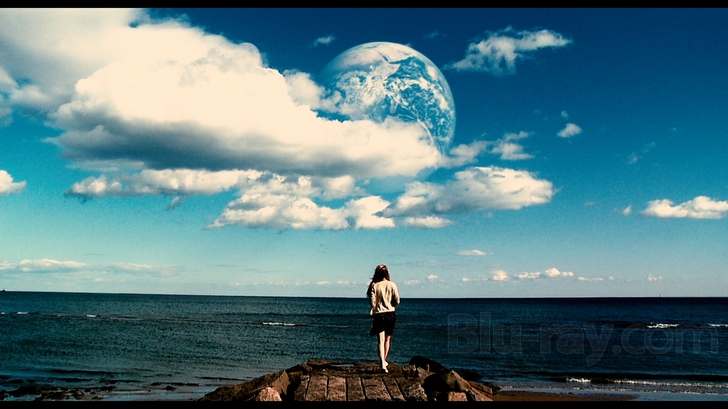
Another Earth
Co-writer Brit Marling plays Rhoda Williams, a space-obsessed high school graduate and soon-to-be MIT student whose college dreams are shattered by the arrival of what will soon be called “Earth 2.” Driving home drunk after a party, she hears about the new planet on the radio and cranes her head skyward, hoping to catch a view. Instead, she plows head-on into a family sedan waiting at a red light, instantly killing a pregnant woman and her five-year-old daughter. The husband and father, composer John Burroughs (William Mapother), is put into a coma, and Rhoda goes to jail for four years—the four years she would’ve spent at university. (Plot point that actually seems like a plot hole: Since Rhoda is a minor, John never learns who actually killed his family, even after he wakes up. This is the crucial fact upon which the entire story hinges.)
In the meantime, the world has been shocked to learn that this approaching celestial body is an exact duplicate of Earth and all its inhabitants. Did it breach from some parallel universe? Is it a sterling example of how anything is possible on a long-enough timeline? We’re never given an explicit answer, but it doesn’t really matter. The point is, it’s up there—dwarfing the moon and filling the sky—and it tangibly poses the kind of questions normally reserved for philosophical thought experiments. What makes me me? If I met myself, what would I ask myself? And might the “me” on Earth 2 make different choices, resulting in a drastically altered life? This last query, of course, is the most pressing for Rhoda and John. Perhaps, on the second Earth, the accident never happened. A scientist on the news talks about possibly altered “synchronicity” between the two planets.
When Rhoda is released from prison she takes a job as a janitor at her old high school—this almost seems like more of a stretch than a new planet suddenly appearing in the sky—and she eventually tracks down John, hoping to ask for forgiveness. But she chickens out at last moment when she sees what a bitter, purposeless slob the once successful musician has become. She genuinely wants to help him, though, so she poses as a maid for a housecleaning service and begins making weekly visits to his messy rural home, where they inevitably bond over Wii boxing, Chinese takeout, and a mutual affection for telescopes. His prickly demeanor softens, her suicidal tendencies abate, and they stagger towards something like love, but Rhoda’s big secret looms larger over them than the planet that brought them together. This isn’t the only complication. Some entrepreneurial Richard Branson-esque explorer has organized a mission to send one lucky individual to the new world, not an astronaut or scientist but—get this— the winner of an essay contest. Yes, really, and I’ll give you one guess who writes the winning entry. Hint: It isn’t John.
But before get the wrong idea about Another Earth and start imagining training montages, shuttle blast-offs, and grand images of space travel, let me remind you that this isn’t that kind of film. It’s more of a talky melodrama built around a single sci-fi concept. And arguably, the movie might have been better if it had dropped the “other Earth” angle altogether and stuck purely with the Rhoda/John conflict, which doesn’t need another planet to work dramatically. The film just doesn’t do enough with the duplicate Earth idea to make it feel necessary to the story. It provides some “wow, would you look at that” visuals and a neat gimmick, but that’s about it. And the cop-out ending—which doesn’t really mean or suggest anything, when you look back on it—certainly doesn’t help either.
There are definitely some flaws here that are hard to overlook—including a script that sometimes tries way too hard, like when Rhoda says “I don’t want to eat the apple of cynicism”—but you can also see why Another Earth got such an enthusiastic response when it debuted at Sundance last year. William Mapother, who you might remember as Ethan Rom—the “other” man—from Lost, once again gets to show how great he is at turn-on-a-dime emotional changes, and newcomer Brit Starling has an easy grace in front of the camera. The two are wonderful together, even when their dialogue ventures into the eye-rolling territory. (John’s tirade about Plato’s cave metaphor comes to mind.) What impresses most, though, is how the movie tries—even if it doesn’t always succeed—to do a lot with very little. The behind-the-scenes backstory is undeniably inspiring, as director Mike Cahill came up with the idea for the film with Starling and actually began shooting in his hometown—with a single HD camcorder—before they even acquired any funding. When Mapother came on board, he even reportedly agreed to work for only $100 a day. It all goes to show that with enough drive, anyone can make a movie nowadays. In that sense, Another Earth is a true success story for aspiring filmmakers, even if it’s not entirely successful as a film.
Another Earth Blu-ray Movie, Video Quality 

Another Earth is presented on Blu-ray with a 1080p/AVC encode, but a quick check online turns up the fact that the film was shot natively in 720p. Not that it matters that much. The truth is, Another Earth probably looks as good here as it's ever going to look given its extremely low- budget origins. Noise is intense, there's harsh aliasing in several scenes—turning close lines into jagged stair steps—and moiré shimmer appears on certain fine patterns, but I doubt much could be done about any of this, as the issues were almost certainly present in the source material and not introduced later. Still, clarity isn't terrible, all things considered, although the picture is consistently soft. On the color end—and this is more of a preference—I found the grading a bit too intense at times, with a heavy bluish tint often applied to the picture in post and contrast that can look too pushed. It is what it is. On the plus side, there's no sign of DNR, edge enhancement, or any compression/image issues besides the ones inherent in the original footage.
Another Earth Blu-ray Movie, Audio Quality 
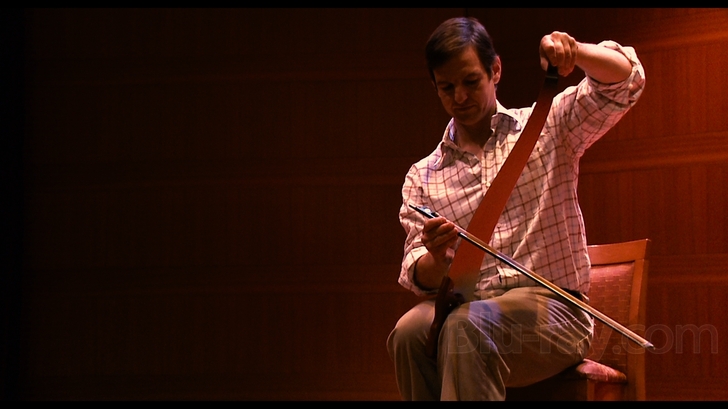
The film's DTS-HD Master Audio 5.1 surround track is a low-budget affair as well, although—unlike the video—it doesn't present any real distractions. Rather, this is just a simple, no-frills mix that does enough to get by and not much more. The sound is anchored in the front speakers and rarely makes it into the rears. There's not much ambience at all, and besides the car crash at the beginning of the movie, there are few distinct effects. The focus here is almost exclusively on dialogue—which is nearly always clean, bright, and easy to understand—but it is worth mentioning the band Fall on Your Sword's excellent score, which combines electronics cues with piano and cello themes for the two main characters. The disc includes optional English SDH, Spanish, and French subtitles.
Another Earth Blu-ray Movie, Special Features and Extras 
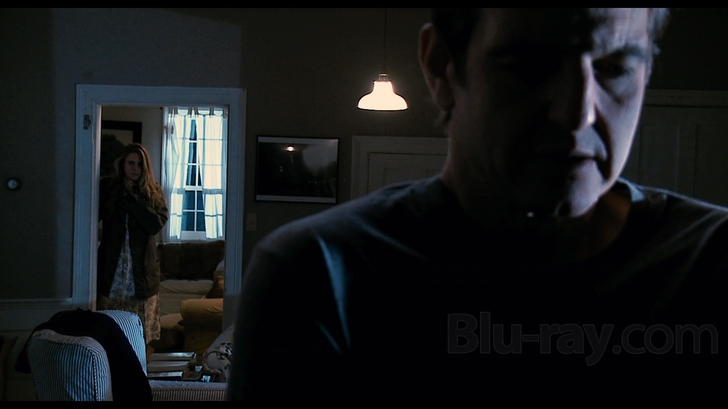
- Music Video: "The First Time I Saw Jupiter" by Fall On Your Sword (1080p, 3:19)
- Deleted Scenes (1080p, 9:20): Seven short deleted scenes, including a laughably bad attempt at showing how Earth 2's gravity might affect Earth 1.
- Fox Movie Channel Presents: Direct Effect with Mike Cahill (SD, 4:17): Director Mike Cahill gives a brief breakdown of the film and talks about the process of writing and making the film.
- Fox Movie Channel Presents: In Character with Brit Marling (SD, 4:22): Actor and co-writer Brit Marling discusses her role and the way it her writing it influenced it.
- Fox Movie Channel Presents: In Character with William Mapother (SD, 4:22): Mapother tackles why he took on the role and what he makes of his character.
- The Science Behind Another Earth (1080p, 2:39): Cahill and Marling sit down with astrophysicist Dr. Richard Berendzen to talk about alternate universes.
- Creating Another Earth (1080p, 2:29): Cahill and Marling discuss the process of making the film with next to no money.
- Trailer (1080p, 2:11)
Another Earth Blu-ray Movie, Overall Score and Recommendation 
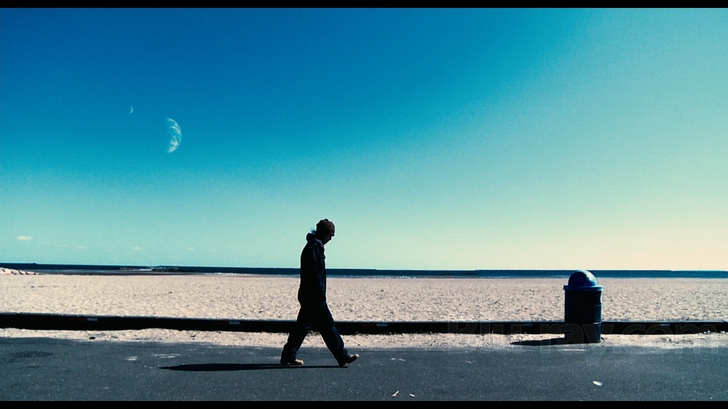
Another Earth will certainly be remembered as the lesser of 2011's two films about phantom planets that sneak up on Earth—it pales next to Melancholia—but even when it doesn't work, it's still a striking example of how to make the most out of a tiny budget. Recommended for fans of similar sci-fi ventures like Moon and Monsters.
Similar titles
Similar titles you might also like

Fahrenheit 451
2018

Moon
2009

The Man Who Fell to Earth
Limited Collector's Edition
1976

We Need to Talk About Kevin
2011

For All Mankind: Season One
2019

Things to Come
1936

Trust
2010

The Goldfinch
2019

Prospect
2018

Slingshot
2024

Donnybrook
2018

Moonlight 4K
2016

When Worlds Collide
1951

Conquest of Space
1955

Fire Maidens of Outer Space
Fire Maidens from Outer Space / Slipcover in Original Pressing
1956

Rust and Bone
De rouille et d'os
2012

Detachment
2011

Vox Lux
2018

The Vast of Night
2019

2001: A Space Odyssey 4K
1968
